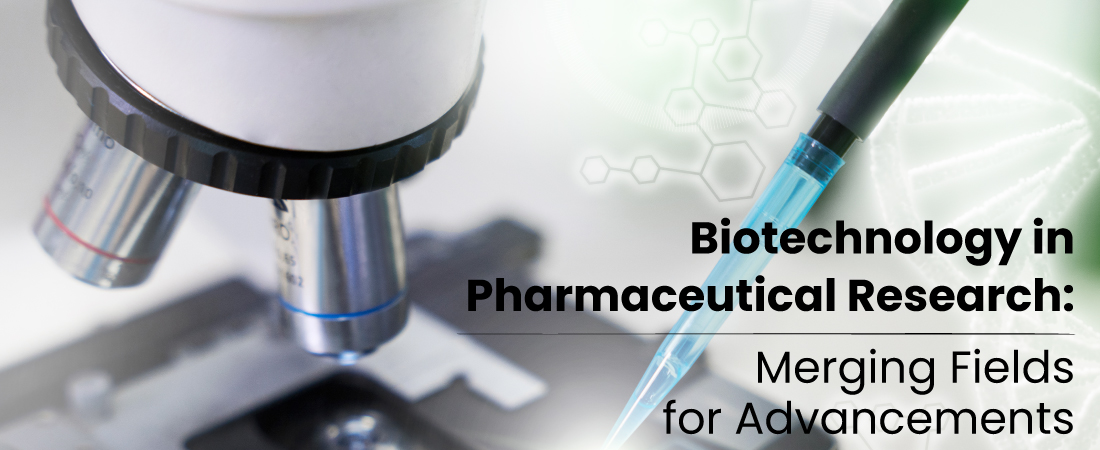
Biotechnology, as the name suggests, is the field of study that intends to improve human health and the overall health of plants, animals and the planet, integrating technology with natural science to produce the most beneficial products and services. Biotechnology is a prevalent subject as it plays a significant role in making new-age medicines and treatments. Let’s take a look in detail at how the subject of biotechnology merges with pharmaceutical research for medical advancements.
Biotechnology encompasses various scientific disciplines, including genetics, molecular biology, biochemistry, and microbiology. It involves the manipulation of living organisms or their systems to develop products and technologies that improve human health and enhance our quality of life. In pharmaceutical research, biotechnology plays a transformative role by leveraging biological systems and processes to discover, design, and produce novel therapeutics known as biopharmaceuticals.
Biopharmaceuticals, or biologics, are pharmaceutical products derived from biological sources such as living cells, proteins, or nucleic acids. Unlike traditional small molecule drugs chemically synthesised, biopharmaceuticals are produced through recombinant DNA technology, cell culture techniques, or other bioprocessing methods. These cutting-edge therapies offer targeted and personalised treatment options for a wide range of diseases, including cancer, autoimmune disorders, infectious diseases, and rare genetic conditions.
One of the critical drivers of innovation in biotechnology and pharmaceutical research is synthetic biology. Synthetic biology combines biology, engineering, and computer science principles to redesign or create biological systems with new functions and capabilities. In biopharmaceuticals, synthetic biology enables the engineering of microorganisms, such as bacteria or yeast, to serve as living factories for producing therapeutic proteins, antibodies, enzymes, and other bioactive molecules.
Through synthetic biology techniques like genome editing, gene synthesis, and metabolic engineering, researchers can tailor the genetic makeup of microorganisms to optimise their productivity, stability, and safety profile. This bioengineering approach has revolutionised the production of biotech pharmaceuticals, making them more cost-effective, scalable, and customisable to meet the demands of patients and healthcare systems worldwide.
As biotechnology and pharmaceutical research evolve, there is a growing demand for skilled professionals with expertise in both domains. In response to this demand, academic institutions offer a range of undergraduate and postgraduate programs to train the next generation of scientists, researchers, and industry professionals.
In Bangalore, a prominent hub for biotechnology and pharmaceutical industries in India, several institutions offer Bachelor's and Master's degree programs in pharmacy and biotechnology. B Pharma colleges in Bangalore provide comprehensive curricula that cover essential topics such as pharmacology, pharmaceutical chemistry, drug discovery, bioprocessing, and regulatory affairs. Similarly, biotechnology degree programs equip students with the knowledge and skills to apply advanced biotechnological techniques in pharmaceutical research and development.
The integration of biotechnology and pharmaceutical research represents a convergence of scientific disciplines with immense potential to drive advancements in healthcare. By harnessing the power of biotechnology, researchers and industry stakeholders can develop innovative therapies, diagnostics, and preventive measures to address unmet medical needs and improve patient outcomes.
One of the top B.Pharma colleges in Bangalore is Dayananda Sagar University (DSU) - College Of Pharmaceutical Sciences or COPS. The College of Pharmaceutical Sciences merged as a branch of the School of Health Sciences, affiliated with Dayananda Sagar University. The college is recognised by PCI, New Delhi, and the Government of Karnataka; It is also a recognised Scientific and Industrial Organization by DSIR, Govt of India.
DSU - COPS offers B. Pharm, M. Pharm, PharmD, and Ph.D. programs in Pharmaceutical Chemistry, Pharmacology, Pharmaceutics, Pharmacognosy, and Pharmaceutical Analysis. The College has vibrant clusters of innovation ecosystems focused on drug discovery and development in collaboration with industrial partners and research organisations. It also has an excellent pharmacy practice department dedicated to improving the healthcare community in association with Sagar Hospitals and Dr Chandramma Dayananda Sagar Institute of Medical Education and Research. Students can benefit from the various research programs at DSU and hone their potential.
College of Pharmaceutical Sciences (COPS) has clusters of research ecosystems across various departments. COPS is involved in transdisciplinary research and focuses on building a vibrant research and innovation campus. The R&D centre is equipped with advanced facilities and modernised labs to support research for scholars and clients of both industry and the clinical sector. COPS - R&D drives researchers to innovations leading to startups and inspires them to be skilled scientific personnel capable of driving the pharma sector with an entrepreneurship mindset.
The R&D centre has an incubation unit with a central instrumentation facility, a centre of nanotechnology and drug development facility, and a Centre for Pre-clinical Research with a small animal experiment facility. The R&D is involved in collaboration and contract research in line with the pharmaceutical industry. Research innovations at COPS DSU are funded by SERB, ICMR, AICTE, and VGST, including private sectors. The institution collaborates with more than 20 Pharmaceutical industries in drug discovery and development.
As we look ahead, the collaboration between biotechnology and pharmaceuticals will continue to drive progress in drug discovery, personalised medicine, and precision healthcare. We can unlock new possibilities for tackling the most challenging diseases and shaping a healthier future for future generations through interdisciplinary education, research partnerships, and technological innovation.
Copyright © 2023 DSU. All Rights Reserved